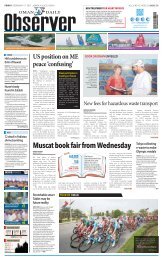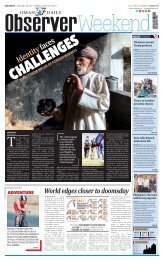GROWING
ICLt100AJRg
ICLt100AJRg
Create successful ePaper yourself
Turn your PDF publications into a flip-book with our unique Google optimized e-Paper software.
ASIA<br />
7<br />
SATURDAY l FEBRUARY 18 l 2017 OMANDAILYOBSERVER<br />
Japan to speed up<br />
frigate build to<br />
reinforce E China Sea<br />
TOKYO: Japan plans to accelerate a<br />
warship building programme to make<br />
two frigates a year to patrol the fringes<br />
of the East China Sea, where it disputes<br />
island ownership with China,<br />
three people with knowledge of the<br />
plan said.<br />
Japan previously was building one<br />
5,000-tonne class destroyer a year,<br />
but will now make two 3,000-tonne<br />
class ships a year, beginning from the<br />
April 2018 fiscal year, the people said,<br />
declining to be identified as they are<br />
not authorised to talk to the media. It<br />
aims to produce a fleet of eight of the<br />
new class of smaller, cheaper vessels,<br />
which may also have mine-sweeping<br />
and anti-submarine capability.<br />
Naval shipyard operators including<br />
Mitsubishi Heavy Industries, Japan<br />
Marine United Corp (JMU) and<br />
Mitsui Engineering and Shipbuilding<br />
are expected to bid for the work, the<br />
people said.<br />
Japan and China dispute ownership<br />
of a group of islands in the East<br />
China Sea, about 220 km northeast of<br />
Taiwan. In Japan, they are known as<br />
the Senkakus, while China calls them<br />
the Diaoyu islands.<br />
Senior Japanese military officials<br />
have said they are concerned that<br />
China may seek to increase its influence<br />
in the East China Sea around Japan’s<br />
southern Okinawa island chain.<br />
Japan provides military aid to Southeast<br />
Asian countries including the<br />
Philippines and Vietnam that oppose<br />
China’s territorial claims in the neighbouring<br />
South China Sea.<br />
In a departure from normal procurement<br />
practice, Japan’s Ministry<br />
of Defense said in a report published<br />
on Wednesday it will require the winner<br />
of the — eight frigate — contract<br />
to offer major portions of the build to<br />
other bidders.<br />
The change is meant to ensure naval<br />
shipyards remain open.<br />
In the past two years, JMU has<br />
won contracts to build the larger Aegis-equipped<br />
destroyers, raising some<br />
concern among defence ministry officials<br />
that rivals could shutter their<br />
shipyards, one of the sources said.<br />
“We need to ensure our ability to<br />
build naval vessels at home,” the person<br />
said. — Reuters<br />
FLORAL DANCE<br />
Ethnic Miao people perform a dance during a local festival in Kaili, Guizhou province, China. — Reuters<br />
Pakistan crackdown on militants<br />
after shrine attack, toll rises to 88<br />
SEHWAN SHARIF: Pakistani security forces killed<br />
dozens of suspected militants on Friday, a day after IS<br />
claimed a suicide bombing that killed more than 80<br />
worshippers at a Sufi shrine in the latest of a series of<br />
attacks across the country.<br />
The bombing at the famed Lal Shahbaz Qalandar<br />
shrine in southern Sindh province was Pakistan’s<br />
deadliest attack in two years, killing at least 88 people<br />
and underlining the threat of militant groups like the<br />
Pakistani Taliban and IS.<br />
With authorities facing angry criticism for failing<br />
to tighten security before the bomber struck, analysts<br />
warned that the wave of violence pointed to a major<br />
escalation in militants’ attempts to destabilise the region.<br />
“This is a virtual declaration of war against the<br />
state of Pakistan,” said Imtiaz Gul, head of the independent<br />
Centre for Research and Security Studies in<br />
Islamabad.<br />
With pressure growing for action, Pakistan demanded<br />
that neighbouring Afghanistan hand over<br />
76 “terrorists” it said were sheltering over the border.<br />
The bombings over five days have hit all four of Pakistan’s<br />
provinces and two major cities, killing around<br />
100 people and shaking a nascent sense that the worst<br />
of the country’s militant violence may be in the past.<br />
A series of military operations against insurgent<br />
groups operating in Pakistan had encouraged hopes<br />
that their leaders were scattered.<br />
“But this has led to a degree of complacency<br />
within our civil-military leadership that perhaps they<br />
have completely destroyed these elements, or broken<br />
their back,” Gul said.<br />
If so, that impression has been shattered by the<br />
events of recent days.<br />
At Lal Shahbaz Qalandar, the white marble floor<br />
was still marked by blood on Friday, and a pile of<br />
abandoned shoes and slippers was heaped in the<br />
Devotees react as they gather outside the closed gate of the shrine of 13th century Sufi saint Lal Shahbaz<br />
Qalandar a day after a bomb blew up at the shrine in the town of Sehwan in Sindh province, some 200 km<br />
north-east of Karachi on Friday. — AFP<br />
courtyard, many of them belonging to victims.<br />
Outside, protesters shouted slogans at police, who<br />
they said had failed to protect the shrine.<br />
“I wish I could have been here and died in the blast<br />
last night,” a devastated Ali Hussain said, sitting on<br />
the floor of the shrine.<br />
He said that local Sufis had asked for better security<br />
after a separate bombing this week killed 13 people<br />
in the eastern city of Lahore, but added: “No one<br />
bothered to secure this place”.<br />
Anwer Ali, 25, rushed to the shrine after he heard<br />
the explosion, and described seeing dead bodies and<br />
chaos as people fled the scene.<br />
“There were threats to the shrine. The Taliban<br />
had warned that they will attack here, but authorities<br />
didn’t take it seriously,” Ali said.<br />
Sindh police chief A D Khawaja said on Friday<br />
that the death toll had reached 88 people with scores<br />
more wounded. Security forces in Sindh said they<br />
killed 18 suspected militants.<br />
On the same day, army and police raids in the<br />
northwestern cities of Peshawar and Bannu killed<br />
seven militants and another six were killed in shelling<br />
on the border with Afghanistan. — Reuters<br />
Malaysian forensics test<br />
samples in N Korea killing<br />
KUALA LUMPUR/JAKARTA:<br />
Malaysian government scientists<br />
were on Friday examining samples<br />
from the autopsy of the half-brother<br />
of North Korea’s leader.<br />
Police were meanwhile questioning<br />
two female suspects who<br />
were arrested carrying Vietnamese<br />
and Indonesian passports, as well<br />
as a Malaysian man, as they attempted<br />
to shed light on the murder<br />
of Kim Jong-Nam.<br />
Lab forensics received samples<br />
from the post-mortem on Thursday<br />
and will “conduct the analysis<br />
as soon as possible”, Dr Cornelia<br />
Charito Siricord of the science<br />
ministry’s chemistry department<br />
told national news agency Bernama.<br />
Malaysia’s deputy prime minister<br />
said on Thursday he believed<br />
North Korea had put in a request to<br />
claim the body through the police<br />
and the hospital, and that Malaysia<br />
was ready to comply once investigations<br />
were completed.<br />
Police obtained a seven-day remand<br />
order for the two female suspects,<br />
Selangor state police chief<br />
Abdul Samah Mat said.<br />
SHOCK AND DISBELIEF: The<br />
family and former neighbours of<br />
an Indonesian woman arrested<br />
over the assassination of the North<br />
Korean leader’s half-brother expressed<br />
shock on Friday that “a<br />
nice person” like her could have<br />
committed such a crime.<br />
The woman, Siti Aishah, was<br />
detained over the killing of Kim<br />
Jong-Nam. Indonesian Vice-President<br />
Jusuf Kalla suggested that the<br />
25-year-old Aishah, was a “victim”<br />
of a “scam” who thought she was<br />
taking part in a reality show involving<br />
hidden cameras.<br />
Malaysian police say that Jong-<br />
Nam was preparing to board a<br />
plane to Macau when he was<br />
jumped by two women who squirted<br />
some kind of liquid in his face.<br />
In the Jakarta neighbourhood<br />
of Tambora, where Aishah used<br />
to live with her then husband, her<br />
former father-in-law was horrified<br />
on hearing the news of her arrest<br />
over the dramatic murder.<br />
“I was shocked — no way,” said<br />
Tija Liang Kiong, 56. “There’s no<br />
way such a nice person would do<br />
that. I could not believe it because<br />
she was a good person.”<br />
“She was kind — if she was not<br />
kind I would not marry her off to<br />
my son,” he added. She married the<br />
son after meeting him while working<br />
for Kiong’s business.<br />
They had a baby and went to<br />
Malaysia to find work but got a divorce<br />
in 2012, Kiong said.<br />
Kiong said the child they had<br />
still lives with his family and that<br />
Aishah last visited her son on January<br />
28. Indonesian immigration<br />
authorities said she flew to Malaysia<br />
from Indonesia on February 2.<br />
— AFP<br />
Kim Jong-Nam sought reform: Japanese author<br />
TOKYO: The assassinated half-brother<br />
of North Korea’s leader Kim Jong-Un<br />
was a courageous man who sought to<br />
reform his country, a Japanese journalist<br />
who wrote a book about him said on<br />
Friday.<br />
Kim Jong-Nam, who was killed<br />
on Monday at Kuala Lumpur’s international<br />
airport, had regularly corresponded<br />
with Tokyo Shimbun senior<br />
writer Yoji Gomi.<br />
“Even if it put him in danger,<br />
he wanted to tell his opinions to<br />
Pyongyang through me or other media,”<br />
Gomi told reporters.<br />
Gomi also said that Kim told him he<br />
had never met his younger half-brother<br />
who succeeded their father Kim Jong-Il<br />
and allegedly ordered his assassination,<br />
sending female agents to poison him,<br />
according to South Korea.<br />
Gomi’s relationship with Kim began<br />
Kim Jong-Nam, who<br />
was killed on Monday<br />
at Kuala Lumpur’s<br />
international airport,<br />
had regularly<br />
corresponded with<br />
Tokyo Shimbun<br />
senior writer Yoji<br />
Gomi<br />
when he spotted him at Beijing’s international<br />
airport in 2004.<br />
They began to regularly exchange<br />
emails in 2010. Gomi also interviewed<br />
Kim in Macau and Beijing in 2011 for a<br />
total of seven hours.<br />
Tokyo Shimbun senior staff writer Yoji Gomi (R) at a press conference entitled ‘Kim<br />
Jong-Nam and his death’ at the Foreign Correspondents’ Club of Japan in Tokyo<br />
on Friday. — AFP<br />
The last contact was via an email received<br />
in January 2012, just weeks after<br />
the death of Kim’s father.<br />
Gomi said that Kim wanted North<br />
Korea to carry out economic reforms<br />
similar to those pursued by China from<br />
the late 1970s.<br />
“He said that the only way that<br />
North Korea could survive would be<br />
to go through the series of reforms and<br />
liberalisation that China had carried<br />
out,” Gomi said.<br />
“He was critical of the system that<br />
was in place in North Korea,” Gomi<br />
added.<br />
“He said that power should not depend<br />
on hereditary succession. That<br />
was not appropriate for a socialist society.<br />
The leader should be selected<br />
through a democratic process.”<br />
He did say, however that at their first<br />
meeting, in Macau in January 2011,<br />
Kim was visibly nervous, sweating and<br />
fidgeting.<br />
Gomi also said he found Kim to be a<br />
polite “intellectual” with a sense of humour,<br />
unlike his reputation as a playboy<br />
gambler, though he acknowledged<br />
he enjoyed drinking, especially in Tokyo’s<br />
fancy restaurants.<br />
“He said that there he was able to<br />
enjoy singing and drinking with South<br />
Koreans, North Koreans and regular<br />
Japanese people, and he said he hoped<br />
that someday walls throughout the<br />
world would disappear like that.”<br />
Kim is often remembered for a<br />
failed attempt in 2001 to enter Japan on<br />
a forged passport to visit Disneyland.<br />
He was expelled in an incident that<br />
was widely seen as an embarrassment<br />
for his father and may have scotched<br />
his hopes of succeeding him as the<br />
first-born son.<br />
But Kim told Gomi he did not believe<br />
that was the reason behind his<br />
father’s decision. In his book, Gomi<br />
quoted Kim as saying that his father<br />
grew angry and distant after he advocated<br />
reform. — AFP









